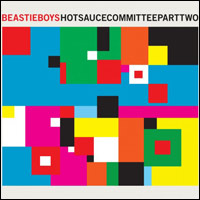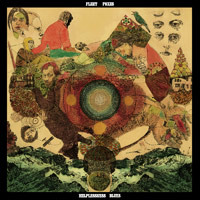
Hot Sauce Committee Part Two
Capitol
It’s hard to believe it’s been almost seven years since the Beastie Boys laid down rhymes on a record. The trio’s untouchable legacy, along with their ability to constantly reinvent themselves, makes it seem like they didn’t go anywhere at all, their relevance never in question. When artists like the Beasties are so good that they essentially receive a “free pass,” it only lasts until their first truly lousy album. Luckily, The Hot Sauce Committee Part Two isn’t it.
The opening song, “Make Some Noise,” dispels any doubts about quality within seconds, fusing the best elements of their last four non-instrumental albums into one hot track. It’s got the live instrumentation of Check Your Head, the grimy production of Ill Communication, the outer space vibes of Hello Nasty and the playful exuberance of To the 5 Boroughs. “OK” is the Beasties’ version of a new wave song, which sounds like a terrible idea (because it is), but they pull it off nicely. Meanwhile, “Too Many Rappers,” featuring Nas, is the sound of two New York rap institutions colliding at full speed while we enjoy the fireworks.
Without forcing things, the Beastie Boys still sound like the pop culture–referencing pranksters they were 25 years ago, even though the average age between them is now 45. The Hot Sauce Committee Part Two is no masterpiece, but it’s nowhere near a misstep either, thus preserving the Beasties’ relevance for yet another generation of listeners.
David Holmes

Helplessness Blues
Sub Pop
If you simply didn’t like what Fleet Foxes were up to on their last album, 2008’s self-titled breakthrough, this one’s not going to make you much happier. They stick closely to their Simon & Garfunkel squared formula, but they elevate their game just enough to make this a great entry point for new fans or the previously dismissive. If you’re among the latter crowd—those who just weren’t quite as impressed as everybody else with the first LP—you’ll probably find this earns the band a second shot at your affections. Halfway through my first listen to Helplessness Blues I found myself thinking, “Geez, this is actually really great.”
“Bedouin Dress” is a prime example of how the Fleet Foxes have progressed. More than any other song they’ve yet released, this one progresses through a series of moods, tempos and sounds. Too often on the debut, they were satisfied to steep a song in a singular frame of mind and stick with it for four minutes, and an awful lot of that record was stuck in the same emotional key. On Helplessness Blues, in addition to the full-on folk mode, they find room for an intimate ballad from singer/songwriter Robin Pecknold (“Blue Spotted Tail”), an eight-minute waltz that builds to an unbearable cacophony halfway through (“The Shrine/The Argument”), and even a lilting instrumental (“The Cascades”). Each song here has its own unique intent, which, when combined with the band’s more adventurous nature, becomes a journey all its own.
Almost every sound on the record is lush and sparkling. There are layers upon layers of harmonizing vocals and a full bass sound that’s missing from a lot of contemporary “indie-rock” releases. The echo on Pecknold’s lead vocals and the 12-string guitar is specifically evocative of a particular moment of late-60s, progressive folk. Clearly somebody knew exactly what they wanted the record to sound like, and there’s a lot of care exhibited in the mixes. The band’s dedication to the record is certainly part of the story here. Determined to get it right, they lost $60,000 of their own money after scrapping the first version, and Pecknold lost his long-time girlfriend in the process. (However, the record’s so good that she took him back after she heard it.) As a whole, the album is a thoroughly worthwhile odyssey, like traveling over old-world terrain as metal, wood and honest voices blend to guide you through the hills and valleys.
Matt Slaybaugh
MP3: “Helplessness Blues”

Hotel Shampoo
Wichita
For the uninitiated, trying to distinguish a Gruff Rhys solo recording from his exploits fronting the Super Furry Animals is a fruitless exercise as all of his songwriting contains a widescreen whimsy that’s equal parts melancholy and sonic exploration of the brighter corners of the pop universe. To say his solo albums exhibit a more personal side of the artist will also lead to dead ends, as Hotel Shampoo, his third release on his own, weaves through colorfully imagined worlds at sea, space-age cantinas, and bachelor pads where martinis are the norm. In other words, while Rhys does tend to pad most of the album with piano-led weepers, beautifully arranged in the style of Nilsson or Bacharach (who is liberally sampled on the lead track, “Shark Ridden Waters”), the songs do nothing to separate Rhys from the kitchen-sink psych of Super Furry Animals.
If anything, Hotel Shampoo harkens back to a time when his band was consistently brilliant, though criminally unheard (most notably the epic pomp and quirk of Rings Around the World). Where on his past two records Rhys seemed to more or less dabble in ideas that were unfinished and somewhat twee, Hotel Shampoo is comprised of rich and effulgent layers. Full of roving strings, plinking electronic ascensions and a bit of sultry saxophone, “Vitamin K” is an obvious standout that would rival anything on those ’90s releases from the Furries. Rhys has always had a penchant for exotica, injecting his songs with oddball instrumentation and signifiers from anachronistic genres, but never succumbing to novelty in his love of classic sounds. Rhys’ gilded miasmas mix mariachi horns and spy-themes into a progression of pop that few seem to manage. Every new album—whether it be from the Super Furry Animals or Rhys on his own—sounds headed for the future, even while pulling from forgotten eras and libraries. It’s nice to see that progression in full bloom on Hotel Shampoo, a record that could stand tall within the Furries’ catalog, but does just as well displaying Gruff’s talent as a premiere 21st century composer.
Kevin J. Elliott

Cat’s Eyes
Cooperative/Downtown
The pairing of a classically trained opera soprano with the gangly frontman for a noisy, soot-stained rock band is no doubt an odd one, and one that probably shouldn’t work on a number of levels. But the oil-and-water mixture of opera singer and multi-instrumentalist Rachel Zeffira and Horrors singer Faris Badwan has proven to be viscid enough to produce results, and by artistic standards, successful.
While the duo’s self-titled debut shifts focus on more than one occasion, the pervading sound here is of pop-noir. Standouts like duet “Face in the Crowd” and “Over You” marry cinescopic tones to girl-group shimmy to be evocative of both the past and someplace in the near future. Elsewhere, the pair vamps up their sound, darkening the corners to resemble the etheric pall of, say, Julie Cruise on “Not a Friend.” On tracks like these it’s Zeffira’s remarkable voice that stands out even when backed by a bevy of instrumentation, including string arrangements that she multi-tracked herself. Badwan takes over the microphone on “The Lull,” a swooning song comprised of horns and strings that seems to find him indulging in some Busby Berkeley dreams. “Sooner Or Later” shows the singer returning to his old ways, groaning through a dirgey ditty that sticks out from the rest of the album like a sore thumb, if only for its dissonance. Otherwise, Cat’s Eyes is a cogent blend of the two artists’ pasts and predilections that’s all the more evocative for where they happen to overlap.
Stephen Slaybaugh

Take Care, Take Care, Take Care
Temporary Residence Ltd.
It’s hard to believe so much time has passed—four years, to be exact—since Explosions in the Sky released their last album, the affecting post-rock opus, All of a Sudden I Miss Everyone. The album was released at a point in my life when I left home and loved ones behind for the first time, and with an all-too-apt title, provided an emotional safety net of sorts. Oddly enough, I again find myself at that awkward time in life when the whole of Take Care, Take Care, Take Care’s message—marrying “youthful idealism with intangible magic”—is apropos.
With the bar set high from the start, the Explosions still possess a certain talent for usurping your emotions and then forcing them out of you whether you’re ready for it or not, and Take Care is not exempt from this phenomena. The booming cinematic quality of past albums, namely How Strange, Innocence, and songs like “First Breath After a Coma” (recognizable from the TV show, Friday Night Lights), is tangible, though decidedly subdued. Take Care is somehow gentler, softer, and true to its name, here the band takes great care with these songs, treating each like a symphony or soundtrack unto itself. This is evident from the very first haunting drags of the strings on the opener, “Last Known Surroundings,” which evolves into a plethora of rhythmic guitars and understated drums. The same can be said about the soothing “Human Qualities” or even the parting appeasement of “Let Me Back In,” which begins with lingering echoes of wispy chatter then meanders progressively into melodic guitars that give way to rolling drumbeats. Alas, only on the feverishly short “Trembling Hands” do we really hear the frenetic energy of some of their past work.
In true Explosions fashion, though, the crux of this album is in the build-up; the band is careful to nurse each song until it’s ready for release, except this time around, the zenith is categorically less grandiose. The Explosions have refined their ability to cultivate songs (sometimes frustratingly) slowly, at the expense of some previous spark and wonder. Not that it matters, but no, I didn’t get the self-awakening for which I was naively hoping. But for a little less than an hour, I escaped enough to forget what I was seeking in the first place. Take Care may not prove to be transformative, but at the very least, it’s a magical distraction.
Jennifer Farmer
ALBUM REVIEWS
Steve Earle, I'll Never Get Out of This World Alive
White Mystery, Blood Venom
Poly Styrene, Generation Indigo
Cass McCombs, Wit's End
tUnE-yArDs,
w h o k i l l
Ponytail, Do Whatever You Want All the Time
David Kilgour and the Heavy Eights, Left By Soft
The High Llamas, Talahomi Way
The Black Watch, Led Zeppelin Five
Mansions, Dig Up the Dead
Meat Puppets, Lollipop
The Kills, Blood Pressures
Atmosphere, The Family Sign
Yelle, Safari Disco Club
